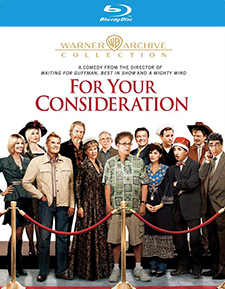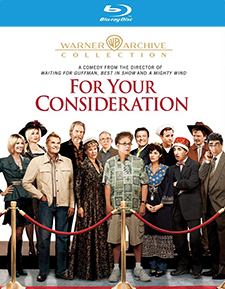For Your Consideration (Blu-ray Review)

Director
Christopher GuestRelease Date(s)
2006 (October 29, 2024)Studio(s)
Castle Rock/Shangri-La/Warner Independent (Warner Archive Collection)- Film/Program Grade: A
- Video Grade: A-
- Audio Grade: A
- Extras Grade: B+
Review
Awards season in the film industry produces ceremonies from the National Society of Film Critics, People’s Choice, Golden Globes, Screen Actors Guild, Directors Guild, National Board of Review, Critics Choice, culminating with the Academy Awards. For Your Consideration is a satire about the making of a movie that generates Oscar nomination buzz for two of its players and features a collection of exaggerated industry types.
Marilyn Hack (Catherine O’Hara, Home Alone) is starring in Home for Purim alongside co-stars Callie Webb (Parker Posey, Blade: Trinity), Victor Allen Miller (Harry Shearer, The Simpsons Movie), Brian Chubb (Christopher Moynihan, TV’s Veep), and Mary Pat Hooligan (Rachael Harris, Freaks of Nature). Set right after World War II, Home for Purim is built around a dying matriarch, her husband, and the return of their two adult children to celebrate a minor Jewish holiday. Marilyn Hack stars as the dying mother. Shearer’s Victor Allen Miller plays the father. As their son and daughter, Moynihan’s Brian Chubb plays a sailor back from the war and Posey’s Callie Webb comes home with a surprising friend.
Shooting is interrupted when studio exec Martin Gibb (Ricky Gervais, The Office) descends on the production to meet with the director and writers. The studio bigwigs have decided that the story is too Jewish. To reach the broadest demographic possible, the Jewishness must be soft-pedaled and the title changed to Home for Thanksgiving.
The director of the film-within-the-film is the beleaguered Jay Berman (Christopher Guest, A Few Good Men). In addition to his ongoing differences with writers Philip Koontz (Bob Balaban, The Grand Budapest Hotel) and Lane Iverson (Michael McKean, Jerry and Marge Go Large), Berman has to deal with Marilyn Hack’s insecurities, and Chubb’s intrusive attempts to create a backstory for his character. And now, he has to figure out how to accommodate the studio’s meddling. Meanwhile, someone on crew mentions to Marilyn that he saw a mention of Oscar buzz for her performance. This brightens her outlook and sets her hoping to become an A-list celebrity.
Covering the lead-up to the Oscars, TV journalists Cindy (Jane Lynch, The Marvelous Mrs. Maisel) and Chuck (Fred Willard, Russell Maniac) chronicle the day-to-day gossip that not one but two actresses in Home for Thanksgiving are being talked about as Oscar contenders—Callie, too, has been mentioned as a possible Oscar nominee.
Behind the scenes we get a look of the often odd workings of Hollywood. Miller’s longtime agent, Morley Orfkin (Eugene Levy, Schitt’s Creek), is so ineffectual that despite Miller’s 40-year-career, he’s still receiving scale as payment and his claim to fame is a memorable infomercial. Morley seems to regard his responsibilities stuffing his face with food from craft services on the Home for Thanksgiving set while discouraging Miller from pursuing roles in movies or TV. Morley enjoys being an agent but neglects his basic job—to find good jobs for his client.
Director Christopher Guest, whose credits also include A Mighty Wind, Waiting for Guffman, and Best in Show, has gathered a fantastic cast who can improvise brilliantly, play cluelessness impeccably, and interact with one another seamlessly. Willard, as the constantly distracted interviewer Chuck, goes off on weird tangents as co-interviewer Cindy patiently allows him to rant before chiming in. At one point, before the cameras roll, Cindy asks him to let her start the interview because she actually has questions to ask.
The script, by Guest and Eugene Levy, is a satirical look at show biz politics and its effect on those in the entertainment field. The exaggerations are wonderfully on target and illustrate the venality and cruelty of an industry built on creating mass entertainment. John Michael Higgins (Licorice Pizza) as officious studio publicist Corey Taft perfectly epitomizes how power can be wielded by not-the-sharpest tools in the box. And the always wonderful Jennifer Coolidge (The White Lotus) as producer Whitney Taylor Brown, whose blank expression, pouting lips, and come-hither eyes suggest that a producer doesn’t have to know about filmmaking as long as she offers a limitless checking account.
But it’s the Marilyn character that the film focuses on—her self-doubts, passive-aggressive manner, and dreams of Oscar fame from her star turn as a coughing, dowdy, bed-ridden hag about to kick the bucket. Marilyn has been in the business for decades and has yet to hit it big. When that glimmer of hope for a career boost is dangled before her, she delights in going on morning shows, evening talk shows, and journalist interviews, loving the spotlight. O’Hara has the ability to blend farcical elements with pathos so that while we laugh at her characters, we also feel their pain.
For Your Consideration is a fast-paced mockumentary along the lines of This Is Spinal Tap, funny not only in its broad characterizations, but in memorable touches, such as director Jay Herman wearing spring lifts in the heels of his sneakers, the lush 40s-style symphonic music accompanying a scene in Home for Purim, a Purim dinner complete with song, location filming on the actual Warner Brothers lot, flouncy make-up man Sandy Lane (Ed Begley, Jr., Amsterdam) telling Marilyn how he wept at one of her old movies shown on TV, and vignettes showing what happens to some of the characters after Oscar nominations are announced.
For Your Consideration was shot by director of photography Robert Schaefer on Super 16 mm film (Kodak Vision2 250D/7205 and Kodak Vision2 Expression 500T/7229), finished as a 2K Digital Intermediate, blown up to 35 mm on Fuji Eterna-CP 3513D1 film for theatrical distribution in the aspect ratio of 1.85:1. Color on Warner Archive’s Blu-ray release is bright for the spoof TV segments to simulate studio lighting. Overall, contrast and clarity are very good. Many scenes are filmed outdoors, but the film-within-the-film scenes have a lush, 1940s look with the women’s make-up era-appropriate. Chuck’s outfits are bizarre and for the Oscar predictions, both he and Cindy wear swami costumes, a crystal ball between them. The hairpieces deserve mention. Levy’s wig for agent Morley Orfkin is black and curly, with a prominent bald spot on top. Shearer’s Victor sports a number of styles, depending on the role. O’Hara’s old lady character wears a grey wig and make-up that ages her at least two decades. Cameras, recording equipment, dollies, and other film equipment are shown during production of Home for Purim.
The soundtrack is English 5.1 DTS-HD Master Audio with optional subtitles in English SDH. Dialogue, which dominates, is clear and distinct. There’s no musical score apart from music for Home for Purim, the movie within-the-movie. There are no unusual sound effects other than ambient background noise on the film set and on the studio lot.
Bonus materials on the Blu-ray release from the Warner Archive Collection include the following:
- Audio Commentary by Christopher Guest and Eugene Levy
- Over 30 Minutes of Hilarious Bonus Material (38:52)
- Theatrical Trailer (2:23)
Commentary – Co-writers Christopher Guest and Eugene Levy share this commentary. The original opening took place in a cemetery, but it was changed to focus more on the Marilyn Hack character. The writers’ method is to work out the story line first and then cast actors for the roles. For Morley, they wanted to “lower the bar,” because “being dumb is better.” The music heard during the Home for Purim sequence was meant to suggest the lush Max Steiner scores of Hollywood’s Golden Age. Wigs and fat suits added to characterizations. A slant board was found for Jennifer Coolidge. This was designed for actresses to rest against without wrinkling their costumes. Backstories were written for each character. Working with the same group of actors over and over is rare in Hollywood. Though a comedy, the film has an undercurrent of tragedy and considerable poignancy. Catherine O’Hara took overt for Gilda Radner at Second City when Radner went to New York to do Saturday Night Live. O’Hara can “ride the line” between comedy and pathos. Making choices is a lengthy process which involves choosing funny while retaining the integrity of the film. The film-within-the-film had to be dramatic, its look reflecting the time period. The final scene was shot after the film was complete because it was felt that a new ending would serve as a bookend with the opening. Marilyn would be the focus in both. The ending “gives the movie texture.”
Over 30 Minutes of Hilarious Bonus Material – The term “hilarious” is not an overstatement. Many of these scenes are as funny as what’s in the film. They include Cindy and Chuck’s repartee; an interviewer questioning Callie and Brian; Wake-Up LA interview with Marilyn and Victor; Cindy and Chuck on the movie lot preparing for an interview; Martin flirting with Whitney by the pool; Brian talking with Jay Herman about his character’s backstory; Marilyn in the make-up chair as Sandy, the make-up man, gossips; the Wake-Up LA weather girl conversing with her monkey hand-puppet; Cindy and Chuck interviewing the Home for Thanksgiving cast; a real estate agent showing a large home to Marilyn; Jay Berman and writers Koontz and Iverson discussing possible future projects; Cindy and Chuck previewing the Oscar nominations; Martin Gibb speaking about visiting England; and the Wake-Up LA weather girl chatting with her monkey puppet about movies.
Every character is a target for mockery and derision in For Your Consideration. The film doesn’t spare the media, always desperate for juicy tales of Tinseltown and its colorful inhabitants. The humor will be particularly resonant with those who are familiar with the filmmaking process. Guest and Levy work more to have the laughs emanate from characters and situations rather than outright jokes. The result is a whimsical glimpse at vanity, incompetence, delusion, power, and hypocrisy.
- Dennis Seuling

